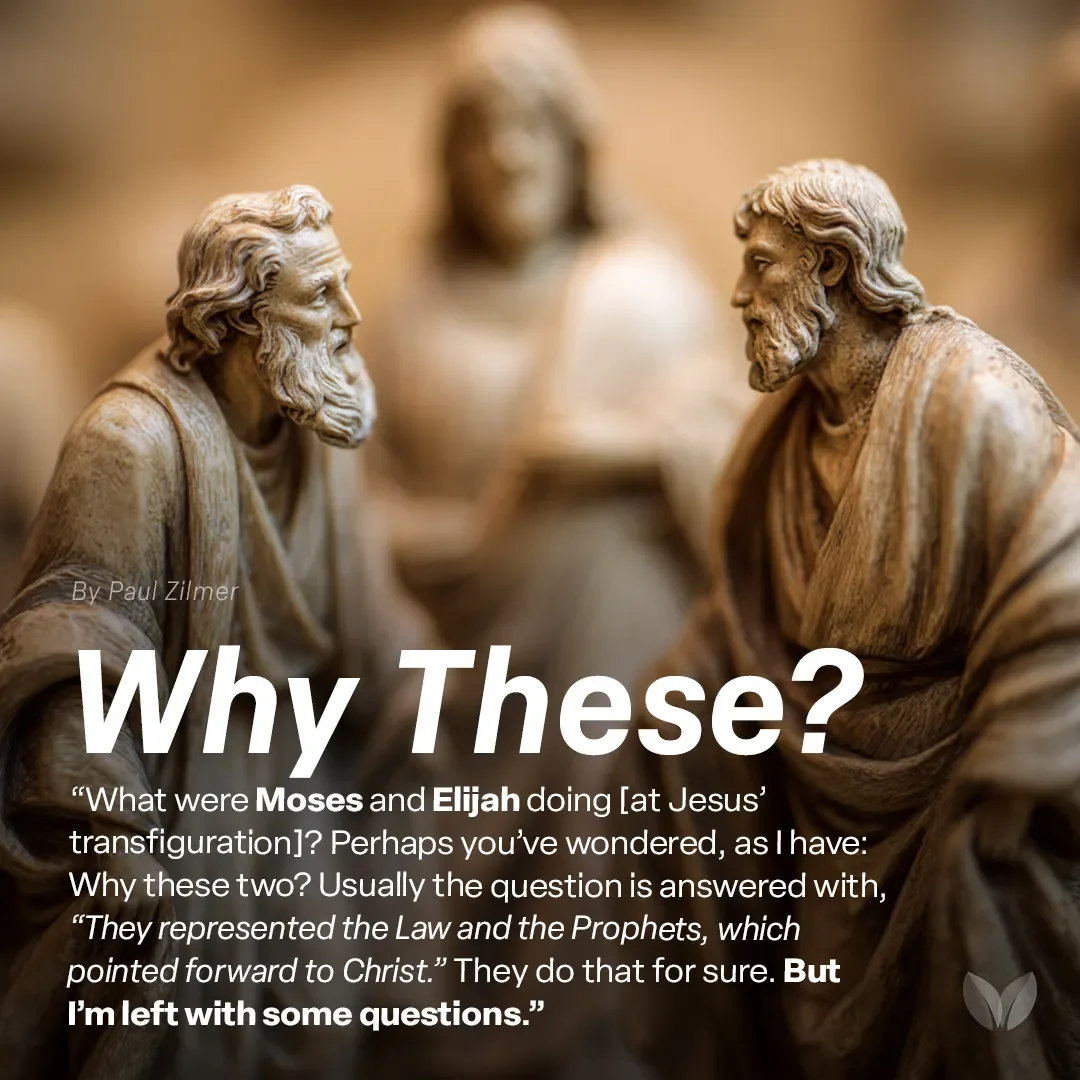Why these?
The event we call “the transfiguration” is recorded by Matthew, Mark and Luke. In all three, it immediately follows Jesus stating, “There are some standing here who will not taste death until they see the kingdom of God.” (Matthew 16:28, Mark 9:1, Luke 9:27)
The records all say Jesus’s clothing became intensely white, and Luke adds “the appearance of his face was altered.” Also, “Two men were talking with him, Moses and Elijah, who appeared in glory.” Clearly this is the fulfillment of what Jesus said—the three apostles chosen to be witnesses of the event saw the Kingdom—the glorification of the King himself, and also the glorification of two of his faithful predecessors.
What were Moses and Elijah doing there? They “spoke of his departure, which he was about to accomplish at Jerusalem.” His departure (or “exodus” in the Greek and in some translations) was his impending death.
Perhaps you’ve wondered, as I have: Why these two? Usually the question is answered with, “They represented the Law and the Prophets, which pointed forward to Christ.” They do that for sure. But I’m left with some questions.
Are Moses and Elijah really the best people of all history to talk to Jesus about his death? Why wouldn’t it be Abraham, for instance, who could talk about giving Isaac, who figuratively “died” and was raised? (Hebrews 11:17-19) Also, it was to Abraham that God first expressed the “everlasting covenant”, and Jesus later at the last supper says the wine represents his blood of the new covenant—which is actually the extension of the everlasting covenant. Jesus’s death is intimately connected with the Abrahamic covenant. Why isn’t Abraham there?
At the last supper, Jesus alludes to Jeremiah 31, where the new covenant is explained. Why isn’t Jeremiah there? Also, he was thrown into the cistern and left to die, then rescued out of it—a clear type of the Christ’s burial and resurrection. Jeremiah could have encouraged Jesus with his own experience of being saved from death.
If Moses and Elijah are there to represent the Law and the Prophets, which foretell Messiah’s work, why isn’t David there to represent the Psalms, which also foretell it? (Think about Psalm 22.) Jesus himself uses all 3, the Law, the Prophets and the Psalms, after his resurrection, to explain the necessity of him dying and being raised. (Luke 24:44) Why isn’t David there?
And is Elijah really the best one to represent the Prophets? He didn’t write a book, as far as we know never foretold the future of Israel, or foretold the work of Christ either. Wouldn’t Jeremiah be a better representative? Or Daniel, or Ezekiel, or Zechariah? Or, surely, Isaiah—just think about chapter 53 of his book. There isn’t anything in scripture that’s more about Jesus’s “departure”.
So, why these two?
I can’t pretend to know, but here’s a speculation, based on considering how each of them ended up. Moses, so faithful for so many years, through so much rebellion, blew it at the end. Got exasperated and pounded on the rock, and took credit for what was actually God’s work. So, in the end he wasn’t permitted to enter the land.
Elijah, after the contest on Mt Carmel, ran away. He quit. He asked God to kill him. He decided he was the only faithful person left, in spite of there actually being thousands—some of whom he personally knew! Graciously, God allowed him to retire, after doing 3 things: anointing Hazael king over Syria, and Jehu king over Israel, and Elisha as his successor. Elijah skipped the first two, went straight to anoint Elisha, and left the other two jobs to him. He didn’t finish the work God gave him to do.
So what might these two say to Jesus? Maybe they were there to encourage him to not give up, not let frustration and exasperation take him off course. To finish the job.
When we wonder “why” about something God does, it’s always the right thing to look at how it ends. Because God’s word does not return to Him empty—it accomplishes what He intends. (Isaiah 55:11)
The ending of the transfiguration is the voice of God: “This is my Son, my Chosen One; listen to him!” The three apostles were there as witnesses, and this command is directed at them. But also, the whole scene was for Jesus’s benefit. He hears whatever Moses and Elijah have to say. And he hears his Father own him—“this is my Son!” And he hears the Father confirm his commission—“this is my Chosen One! the one to be listened to.”
Jesus knew where he was going, knew the exodus he had to make. It was a horrible prospect. In Gethsemane he would pray with fervor for some other way. But there wasn’t another way. To help him get through it, perhaps this event enabled him to hear the voice of Moses in his mind: “You’re almost there. Don’t let exasperation with these wrong-headed people make you drop the ball at the end, and fail to enter the land.” And the voice of Elijah: “Finish the job. Do all that God commands you. It may look like you’re all alone, but there are thousands on your side, and they’re depending on you.”
If so, then we ought to listen to those same voices. Don’t let frustration deflect you from what God has given you to do. Don’t quit—finish the job. You aren’t alone. Can’t you “see” the Kingdom of God and the glorification to come?
Love, Paul


